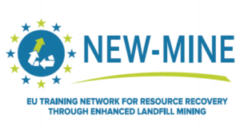On September 1, 2016, the ‘European Training Network for Resource Recovery Through Enhanced Landfill Mining’ (NEW-MINE) kicked off. The project generated more than 40 scientific publications in domains ranging from geophysics via mechanical process engineering to ceramics. Researchers from the Montanuniversität Leoben and SIM² KU Leuven have now published a review paper that summarises and links these NEW-MINE publications and discusses their practical applicability in broader waste management systems. The work has been published in the Open Access journal “Processes”.
About NEW-MINE
On September 1, 2016, the ‘European Training Network for Resource Recovery Through Enhanced Landfill Mining’ (NEW-MINE) kicked off. The project, funded by the European Commission under the Marie Skłodowska-Curie Actions (GA nr. 721185), aimed to develop and integrate cutting-edge, eco-friendly Enhanced Landfill Mining (ELFM) technologies to valorise Europe’s 500,000 landfills, thereby recovering resources (materials, energy, land), while mitigating future environmental and health risks associated with landfills as well as avoiding enormous landfill-remediation costs.
Within the NEW-MINE project the researchers produced, in a first step, concentrates of specific materials (e.g., metals, combustibles, inert materials), which might be used as secondary raw materials. In a second step, recycled products (e.g., inorganic polymers, functional glass-ceramics) were produced from these concentrates at the lab scale.
Review paper in Processes
The NEW-MINE project yielded more than 40 publications ranging from geophysics via mechanical process engineering to ceramics. In a critical review paper, published in the Open Access journal Processes, researchers from Montanuniversität Leoben and SIM² KU Leuven have now summarised these NEW-MINE publications, while discussing their practical applicability in broader waste management systems.
Huge barriers remain
The publication provides an excellent overview of the status of the Enhanced Landfill Mining research agenda, showing both the achiements and the remaining technical and non-technical barriers.
The authors conclude that, even if secondary raw materials or recycled products could be produced at a large scale, it remains unclear if they can compete with primary raw materials or products from primary raw materials. Given the ambitions of the transition towards a more circular economy, economic incentives are required to make secondary raw materials or recycled products from enhanced landfill mining (ELFM) competitive in the market.
Full reference paper
Vollprecht, D.; Machiels, L.; Jones, P.T. The EU Training Network for Resource Recovery through Enhanced Landfill Mining—A Review. Processes 2021, 9, 394. https://doi.org/10.3390/pr9020394
Acknowledgements
The NEW-MINE project has received funding from the European Union's EU Framework Programme for Research and Innovation Horizon 2020 under Grant Agreement No 721185. http://new-mine.eu/. The authors thank the entire EU MSCA-ETN project team for the marvelous collaboration during the NEW-MINE years.
Featured Image: the EU MSCA-ETN project team, during the Mid-Term Review meeting held in Leuven (August 2018)


